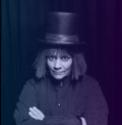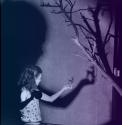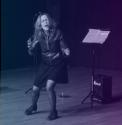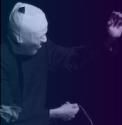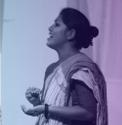Transit 6 - Theatre - Women - Periphery
The festival has been going for a few days of workshops but this evening was the formal opening for the presentations and performances. I have tried to capture the essence of Julia Varley's opening address below:
An overturned music stand. Scattered pages and small stones. Julia stands by a piano in the long white room. Brigitte Cirla sings something in French from behind us. And then Natasha enters humming and making bell-like overtones. It is a beautiful improvisation and Brigitte joins her voice together with Natasha’s. It becomes a dialogue. And then a conversation as Parvarthy from Bengal stands up and begins to sing and dance. They conclude and then Iben enters the space and begins falling out of balance, catching herself, coming back to centre, and then falling again. Then Jills’ daughter, sweet fifteen year old Meg, stands up, tugs her purple skirt and walks to the piano where she plays and sings her own song ...It takes a while to see...
And now Julia in white with a blue overcoat that has yellow and orange flowers asks if languages have been organised. They haven’t, and there is a moment of shuffling so the non-English speakers are near to those who can translate. Julia is patiently waiting, quietly contained as always. She begins with a story about an earthquake a the previous Magdalena gathering in Italy. There was a lot of confusion. The next day they decided to do the performances even though the theatre had lost part of its roof. They found another space to perform it. Noemi, the scholar, had been buried in her home. Julia insisted the work go on, saying Noemi would have wanted it. The she said “when you cannot feel the ground under your feet you can always go back to the work. And offer your work to others.” She went on to acknowledge the three singers that had welcomed us into the space, starting from a distance, geographically and in terms of form, and then coming into dialogue and conversation. She said Iben’s ‘falling out of balance’ exercise was deeply connected to her question about the periphery, and she described Meg’s offering of the song as the start of along journey, also a place of risk. Julia said “Theatre speaks in a deeper way than I can do with words.” She went on to acknowledge all the performers and spoke of feeling great privilege because she knows everyone in the room and is aware of the incredible richness gathered here.
Next she posed a question: Where does the motivation to go on making work come from, without the energy of youth? “I feel nagged by the increasing speed of our world. Our world is going faster. Young people are used to this and expect results to come quickly. They have not been trained to patience. They expect immediate results.” When Julia thought of the periphery she thought of geography, culture, outskirts of cities, the ‘edge’ of theatre (live art, theatre that is explicitly political or with strong social themes). But mental balance only occurred to her later when she realised it was the theme of many of the performances. And also, realising that many of us feel alone. Ad in this lonliness is the effort to retain balance.”My heart is in my centre, but it is only when I I take a risk to leave my centre that I have the possibility to go somewhere. This is how we keep working in a world that seems to need us less and less. It is possible to place and sell performances. New media does not seem to need our skills. The world is faster, bigger, noisier, and so we go in the opposite direction. Iben falls and then she goes back. The tension between the centre and losing it completely is the tightrope. The relationship between what we know and the going where we don’t know.”
She recalled a conersatio when Jill Greenhalgh had asked the question: why am I so bored looking at theatre performances but I get so excited watching Federer play Nadal? They decided it was 1. Because they play well and 2. Surprise – you don’t know how it will finish. Then she said “Being on the periphery should not justify our performances being bad.” She said she is afraid we do not do our best because our life is difficult or our situation or economy is difficult, but that we need to work our craft to the maximum (through inevitable patience and boredom). “Why do we allow our performances to be boring?”
She reminded us that it is the performer who needs to go on the journey. If we are too preoccupied with ourselves the audience cannot take the journey out from the centre.
She concluded by offering us a personal answer to the question she began with: How, where does one find the motivation when one does not have the energy of youth? For Julia it is in small meetings, for example meeting all the children of the in Holstebro as Mr Peanut and observing their absolutely individual expressions. Or when someone thanks her for continuing the work and lets her know that this supports others to continue also. “So many of the older women are now leaving us” she said. “As we keep on, we keep on for them, too, and in this I find meaning. In this tension between the periphery and the centre.” She described Odin as a safe place to come home to but also a place to take a risk. Finally she shared the story of a bridge that was blown up (at the command of a theatre director) and which now, the children jump from, into the waters, the leap a symbol that they are growing up. “Our periphery is in the jump.”

